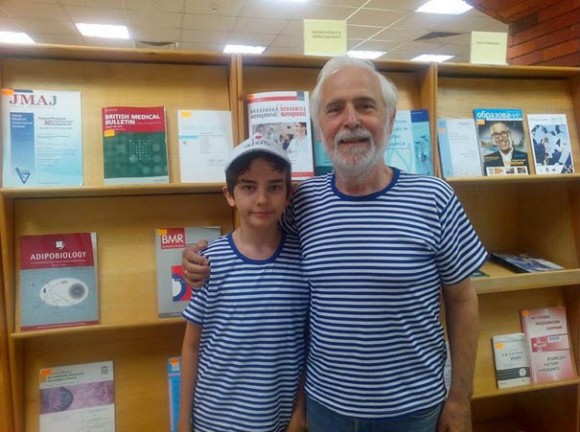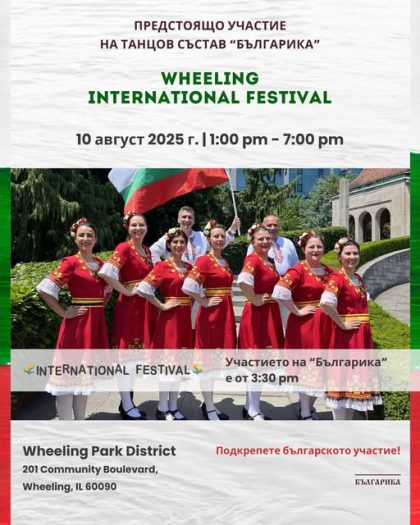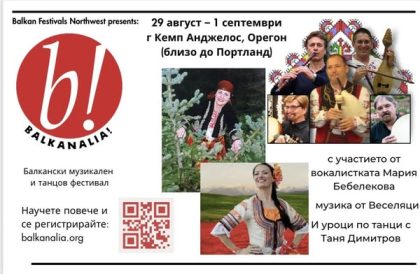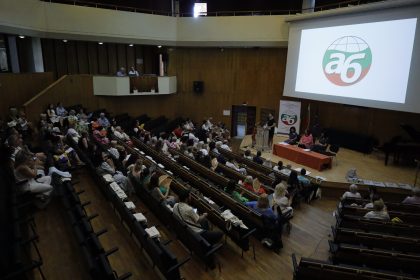Interview with Dr. G.N. Chaldakov
(PART 3)*
.

– You are a member of the editorial board of several scientific journals, including InSpiro. You apply the approach of combining science and art also in your textbook Cell Biology, in which you explain the complex world of the cell through examples, curious facts, historical and artistic references. To study Cell Biology in such a way is undoubtedly intriguing.
– That’s right, this, as well as imagination and associative thinking are an essential part of my didactics. You know steam of consciousness, a writing style of James Joyce, Samuel Beckett, Franz Kafka and other famous writers An essential component of my teaching style is steam of associations, as illustrated by my grandson’s picture on the inside back cover of Cell Biology textbook. „Imagination is more important than knowledge because knowledge is limited“ – says Albert Einstein. Poets turn imagination into metaphors, scientists – into hypotheses and concepts, into knowledge. F.M. Dostoyevsky, Peyo Yavorov, Hristo Photev and Konstantin Pavlov have given me more than George Palade, Albert Claude, Rita Levi-Montalcini and Günter Blobel (great scientists, Nobel Prize winners). This is a paraphrase of Einstein’s great thought: „Dostoevsky has given me more than Gauss.“
I wish students were acquainted with: The Little Prince by Exupéry, Winnie the Pooh by Alan Milne, Alice by Lewis Carroll, We, the Sparrows by Yordan Radichkov, Don Quixote by Cervantes, Crime and Punishment by Dostoyevsky, Zorba the Greek by Nikos Kazantzakis, There is no Such a Book by (Dr) Lyudmil Stanev. Also they should know about the theater director Krikor Azaryan, here’s one of his wise thoughts: „Can you imagine what life would be like if you felt the pain you inflicted? The world would be completely different.“
This is a lesson in moral philosophy, a poignant voice of „the intimate acoustics of human soul“ – I teach my students such lessons, as well. And I advise them that they are going to learn much more from the lectures of the philosopher of our University – Aleksandar Stoychev.
– Have you got a favorite verse by the great Bulgarian poet Hristo Photev?
– All of Photev’s poems are my favourites… I will now recite a part of „I Was at the Very Top…“:
I was at the very top of my youth.
I used to be wild, disproportionate and handsome.
I loved you with no mercy – with rage –
and I wonder I am still alive.
And the end: And I’m sorry I am still alive.
Hristo Photev himself loved reciting this poem of his.
And one more:
My heart was in its prime strength.
It wasn’t an ex-one as it’s now.
Gathering the chlorophyll of every spring
It burst out – the snow turned to green.
Reminiscent of Lorca, right:
The golden girl
bathed in the water
and the water turned to gold.
– And what is the source of your inspiration?
– The unknown in biomedical science. A good poem, a painting, a melody… and charming women and good wine, of course! For example, listen to the Lorca’s Ditty of First Desire:
Soul,
turn orange-colored.
Soul,
turn the color of love.
– Prof. Mihail Davidoff from the Medical University in Hamburg describes your textbook of Cell Biology as wonderful artwork with an original conception and perfect accomplishment. Do you believe that the textbook will help future and present physicians become better professionals?
– Yes, I hope so. I also believe it will be beneficial both for the knowledge and even more important, for the mode of thinking of the curious students, teachers, PhD students, doctors and biologists. My textbook was written in-depth and it is advisable to be read in-depth if the reader wants to acquire in-depth knowledge on Cell and Matrix Biology and its importance for the understanding of diseases, prevention, therapy. To be a textbook author, is profound responsibility – come on, remember Emily Dickinson again…
– You are a guest-professor at universities in Italy, Serbia and Japan. Could you say that Bulgarian students are among the most curious ones?
– There are curious and talented people in all countries. The countries providing care, incentives and appreciation for the curiosity and talent make a progress and they can boast better health and quality of life (QoL). However, I am really worried about the over-liberal doctrine (not just in the economy) and the globalization, the Americanization and other variations on this topic. I am worried about our vulnerability to the actions of the most detrimental human symbiosis, the one of the talented amorality, of „the sustainable amorality,“ as Dostoyevsky called it. Anyway, He expressed his conviction: „I will not and cannot believe that evil is the normal condition of mankind. And yet how simple it is: in one day, in one hour everything could be sorted out.“ Hopefully, so be it in Bulgaria, too.
– What have you been working on at the moment?
– The English edition of my Cell Biology, which will be entitled Principles of Cell Biology, and the organization of the 4th ISAA in October in Bucharest.
– Is there a question you cannot answer?
Well, I do not have answers to a plenty of questions – that is my serious answer. And here is a facetious question I have no answer to: „Once a man learns to ride a bike, he can do it forever. Then why, once a man gets to know women he cannot know them forever?“ Dr. Valcho Yordanov – a pharmacologist, psychiatrist and psychoanalyst – eventually he might know the answer to this consequential question.
– Your message to our future students.
My message to the present and future students is: Be healthy and curious! Be a true BHF. Love each other – and forever! Respect your parents, patients and your teachers. Follow the Ten Commandments and the Hippocratic Oath. I sign my message:
Sincerely yours,
George N. Chaldakov, GF (Grandfather), BHF, MD, PhD, DHC, FIACS

And with your permission, here’s one of my attempts to write „vertically“, entitled
A fortiori
The bird is not jealous of the airplane.
The fish is not jealous of the dolphin.
The grass is not jealous of the flowers.
A man who crawls is jealous of
A man who walks.
A man who walks is jealous
Of a man who flies.
A man who flies is not jealous of
Someone else who flies.
In other words: „To transform jealousy into admiration“ and „Help me to elevate you“… (written in 1869 on the door of a school in the city of Kotel and rewritten in the novel “Elevation” by Milen Ruskov).
Interviewer: Darina Velcheva
Translator: Milena Popova
––––––––––––––––––––––––––––––––––––––––––––––––
* The first part of this interview can be read here, the second – here.
.



